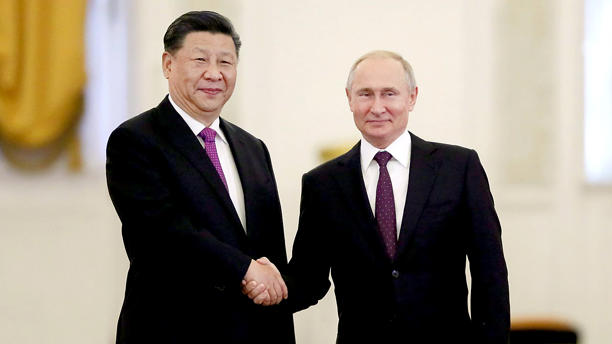Bu Joel Gehrke
Russia’s invasion of Ukraine will “accelerate” the inauguration of a “new world order based on law and justice” in which economic and political gains will justify the losses sustained thus far, according to Russian President Vladimir Putin.
“We’re facing a historic milestone,” Putin told the Valdai Discussion Club in a Thursday address. “Ahead of us is possibly the most dangerous, unpredictable, and, at the same time, crucial decade since the end of the Second World War.”
Putin took the stage against a backdrop of international anxiety about the risk of nuclear escalation in Ukraine and domestic Russian anger that a series of Ukrainian successes forced the Kremlin to send unprepared conscripts to the front lines. Putin insisted that “a flare-up” of some sort “would have happened regardless of how Russia could have acted in Ukraine” due to a purported decline in Western power and maintained that his policies would “accelerate” that process.
“Yes, there are some issues — I refer to the losses incurred due to the special military operation — and I always say that, yes, there are economic losses, but there are also enormous acquisitions,” Putin said through an interpreter. “What is happening, indubitably, in the end — I emphasize that — in the end, will benefit Russia and its future. Why is that? Because it’ll help reinforce our sovereignty in all domains, and in particular, in the economic field.”
Russia has labored under a rash of economic sanctions imposed by the United States and other advanced democracies, from Europe to Japan and Australia. The immediate financial effect of those sanctions was softened somewhat by Europe’s continued need to purchase Russian energy supplies, but Secretary of State Antony Blinken’s team has pointed to Russia’s dependence on Iranian drones as evidence that export controls are crippling Russia’s manufacturing sector.
“Russian hypersonic ballistic missile production has nearly ceased due to the lack of necessary semiconductors used in the manufacturing process,” the State Department asserted last week. “Exports on certain goods and services, including dollar-denominated banknotes, accounting, management consulting, quantum computing, and trust and corporate formation services to persons located in the Russian Federation are now prohibited.”
Yet Putin countered that Russia has proven more resilient than Western officials would have expected and pivoted to an argument that a “new world order should be based on law and justice” — a prospect, he insisted, that would require the formation of a new international financial system impervious to U.S. sanctions.
“Is it possible? Yes. It would require a lot of effort and joining efforts of many countries, but it is possible,” he said. “And that would rule out the possible abuse in new global financial infrastructure that would allow to effectively beneficially and safely and securely do without the dollar and other so-called reserve currencies in international payments.”
Putin denounced “the Western globalization model” in terms that would be familiar to many American critics, but his criticism came with a twist on typical American debates about free trade and other economic policies. The Kremlin chief insisted that the structure of the existing world order is advantageous to the United States and its allies.
“As soon as you open your market for certain items, goods, then the local producer is going down, and it’s almost impossible to bring back the industry,” Putin asserted. “That’s the way they build the relations. That’s how they take over markets and resources that countries are left without their technological and scientific potential.”
That allegation echoes U.S. criticism of China’s Belt and Road Initiative, an overseas infrastructure program that allowed Beijing to take control of a port in Sri Lanka after the impoverished government struggled to make loan payments for the project. Putin, for his part, praised the Belt and Road Initiative while denouncing the “standardization” of Western economies.
“This has been the foundation of the Western globalization model, whose nature is neo-colonial basically,” he insisted. “And the task was clear, to reinforce absolute dominion of the West and the world economy and the world politics.”
Russian and Chinese officials for years have invoked the legacy of European imperialism as a way to cultivate relationships in Africa. Putin, playing on this theme, held out the hope that Russia, China, and the developing world would forge “Eurasian economic unity” if the U.S. dollar is displaced as the global reserve currency.
“Some power centers are wilting. … New ones are emerging mostly in Asia but also in Africa,” he said. “Africa is still a very poor continent, so far, but you see the great potential to tap into here. And the same applies to Latin America. And these changes will happen, these tectonic shifts.”


He invades a country and gets handed his ass. Then he wants the world to compensate Russia for its losses? The New World Order is nothing but communism in disguise.